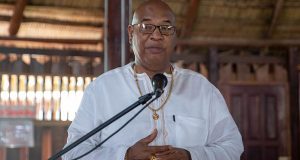GEORGETOWN, Guyana CMC – The state-owned Institute of Applied Science and Technology (IAST) says it has been able to secure approximately US$35 million in investments due to an investment partnership with the Asian-based Pinnacle Green Resources.
Pinnacle is a multi-national company from India and Singapore with presence in Taiwan, Hong Hong, and various parts of India.
ISAT said the public-private sector partnership will result in the creation of an estimated 500 jobs and take the country closer to adopting a green economy.
In exchange for providing technical and scientific support to Pinnacle, IAST will receive five per cent equity from the entire project, which includes the construction and operation of a facility that will produce 200 tons of wood-pellets daily for export to Europe.
In the execution of this project, Pinnacle Green Resources (Guyana) Limited will begin cultivation of an energy plantation on 5, 000 acres of land in the Akawini area in the Pomeroon, Region Two.
Pinnacle has established a Memorandum of Understanding (MoU) with Go-Invest for the lease of the land. The price for truck delivery to private consumers in sacks is estimated at Euro 333 (One Euro =US$1.29 cents) per tonne, while the price for bulk delivery is slightly lower.
The second project involved the construction and operation of a facility to produce three tonnes per day of activated carbon from coconut shells, primarily to service the gold recovery industry in Guyana.
IAST head, Dr. Suresh Narine said that there is a growing demand for activated carbon both locally and internationally. Apart from the gold mining industry, it is also used in the beverage and pharmaceutical industries.
Activated carbon is a non-graphite form of carbon which could be produced from any carbonaceous material such as coal, lignite, wood, paddy husk, coir pith, coconut shell, etc. Dr. Narine explained that as the coconut industry benefits from investments like these, it will no doubt lead to a growth in production.
The third project will see the construction and operation of an eight MW electricity generating facility using bio-mass.
A study by the Economic Commission for Latin America and the Caribbean (ECLAC) has indicated that Guyana has the capacity to generate annually, 300 per cent of its diesel demand equivalent in bio-mass; however, that potential is yet to be fully harnessed.
President Donald Ramotar said that he had been advocating for IAST to move into more commercial-type and value-added activities.
“I am extremely happy that we are beginning to see this now. This project will not be putting any pressure on our forest…,” he said, adding that the project will be a major boost to residents on the Essequibo coast, which has till now, depended heavily on rice.
 Pride News Canada's Leader In African Canadian & Caribbean News, Views & Lifestyle
Pride News Canada's Leader In African Canadian & Caribbean News, Views & Lifestyle




